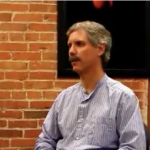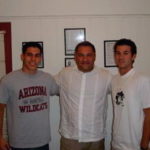At first glance, Cathy Anderson hardly appears capable of a furtive takeover of a company, yet that is precisely what she did. In 1997, upset with what she calls “ethical issues” in the San Diego chamber of commerce, Cathy moved the San Diego Film Commission, the organization she still heads, literally in the middle of the night. Through coordination with her fellow employees, who were also perturbed by issues of ethics, Cathy managed to secretively make autonomous a government funded organization, and neither she, nor her employees, ever missed a paycheck.
After graduating from college with degrees in film and theater, Cathy became quickly disillusioned with the meager compensation offered to the regular folks who tread among the stars. She left the industry to teach, but thanks to the support of her husband, who insisted she do what she love. This led her to a volunteer position with the film commission, from which she established herself as an invaluable leader.
She advises that only through communication was she able to earn the trust to take control in 1997, and suggests that all aspiring leaders focus on their communicative abilities. San Diego is lucky to have Cathy, and the $80 million dollars left in their community last year alone, by film, print and television crews capturing the beauty of what lies south of Hollywood.
Interview
I think when people don’t like their job, there is an element to it that is abusive in some way. You aren’t treated well, or there is some facet to your job that is unpleasant because of money, ethical issues. I was faced with an ethical issue.
I was having to do things that I didn’t think was right. You have three options in any situation. You can either change it, you can live with it, or you can leave it.
I did something a little different. When I went to leave, I took the whole organization with me without the boss knowing.
I set it up as an independent corporation and then I remembered everything that made it unpleasant to me and made certain the folks here never had to face that. I made the workplace a place where they didn’t have to feel stressed. Where if they have to do something in the middle of the day, they don’t have to wonder whether they can get off work.
I could have been fired. But it was worth the risk. Because it’s where she wanted it to be.
Overnight takeover.
We were in a bigger organization, which was the chamber of commerce. Their job was to manage us. The money was in place with taxpayers money. I was under the impression that we had so much money to spend. When I really looked at the money, I realized they were using half of it for other things. I was concerned that we wouldn’t be able to do our business. I tried to change the mind of leadership.
I couldn’t make any headway. I couldn’t live with it. I couldn’t change it. So I had to leave.
I checked with the people who were with the organization at the time and they felt the same way I did. They didn’t like working under it, but they needed a job. I asked them if they were closed to quitting. They said yes. We made a bargain that we would all be quiet about it and move out together, and we could get fired, but it was worth the risk.
We selected the Wednesday before Thanksgiving in 1997 and waited until after closing hours. We moved all the office furniture out of the chamber and into this building that was already set up for wiring.
We moved in and kept our phone number. I didn’t even miss a paycheck. We basically just, snuck out. And I could sleep at night.
Advice at 22?
In the film industry, most people are mistaken in thinking that they want to be a director. Or they want to be a producer. Or an actor. Actually, there are so many levels of other things you can do that are just as exciting if you knew.
One of the young people who worked under us as an intern became a storyboarder for Warner Brothers. He sat around and drew all the time and it never connected that he could find an occupation doing that. There is work out there, it’s just being persistent.
That’s what our project is all about. Exposing those possibilities. Because people our age graduate school, they get a job, and they start working their way up or jumping ship. But there’s so many different routes you can travel down.
The common denominator for any good job is communication. Because if you can communicate with people then it will be a good job.
I see too many people my age that can’t wait to retire because they hate what they do. And that’s really really sad. Because they’re spending their whole life waiting to retire. That’s just not the way to live your life.
I’m a retireable age. I turned 60 the other day. My husband is already retired. But I’m having too much fun. And our organization is suffering from a lack of funding. I don’t feel good about leaving it like that.
You have three options in any situation. You can live with it.






